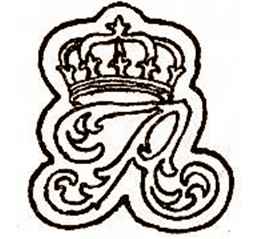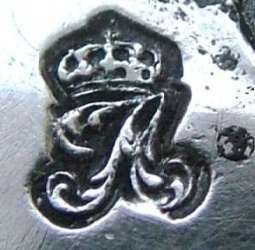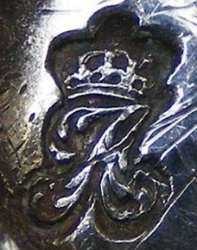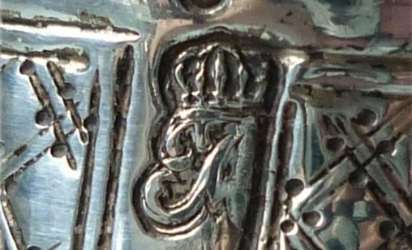(click on photos to enlarge image)
AN IMITATION OF LOUIS XV HALLMARKS (II)
The example of Paris, 1768-1774
Among the objects of the French "Ancien Régime", the
production of the long reign of King Louis XV (1722-1774) is the
most frequent victim of forgeries and fraudulent attributions.
This phenomenon, interesting particularly the furniture, widely
affects also the silverware, with a special predilection for the
prestigious production of Paris.
Fortunately, the forgers rarely have a deep knowledge of the
characteristics of the object that they falsify. The results of
this ignorance, combined with the limited time available, are
the numerous errors present in their forgeries.
The example below illustrates a manifest error committed in the
imitation of a French hallmark. The object interested to the
forgery is a cup with a heavy chasing decoration (quite far from
French taste of that period), attributed to Paris 1768-1774
production.
The cup bears also a 19th century French import mark. A meager
consolation for the unfortunate owner of this piece. Through
this mark he obtains only the confirm of the silver fineness (sterling)
of his object.
The mark that allows the identification of the fraud is the "poinçon
de Charge de Paris", used in Paris from 1768 to 1774. The "Charge"
is a tax mark engaging the silversmith to pay the fee when the
piece is finished and ready to be sold.
Various images of authentic marks are illustrated below.
Scheme of the "poinçon de Charge", Paris 1768-1774
Since 1672, when was introduced the tax on the silverware
(the "Droit de Marque"), Paris used in its mark the letter "A",
crowned and highly stylized. This mark was subject to changes every six years,
in its shape and calligraphy. Here below are illustrated
various marks used in the period 1768-1774.
Authentic marks (examples)
Fake mark
A superficial examination of the mark could, in good faith,
attribute the object to Paris, 1768-1774 production.
Unfortunately it is a fake, as can be demonstrated at a closer
look.
In the pictures below I put side by side the schemes of the
authentic and of the fake mark (anyway do not forget to refer
also to the photos of the authentic hallmarks):
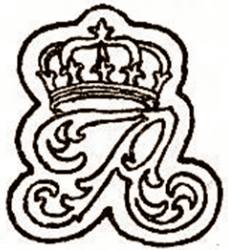 |
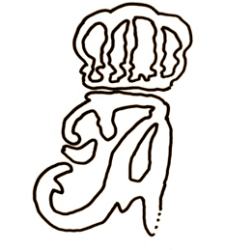 |
vrai poinçon
|
faux poinçon
|
the first evident defect (sufficient in itself to identify
the fraud) is the absence of the small foliate scrolls on the
left leg of the letter "A";
- the "crown" in the authentic mark has on the top a small "fleur-de-lys".
The forger omitted this detail;
- the proportions of the crown do not respect the scheme and it
results oversized high. On the contrary, the five "fleur-de-lys"
on the base are much smaller than the reference pattern.
References and Comments
For a deeper examination of the authentic hallmarks, the
reader can refer to my other article
"Silver Hallmarks of Paris (1723-1774)", published in
ASCAS web site (November 2008, n. 103)
Ultimately, this is a fraud less dangerous of other forgeries
involving the chiselling (instead of the punching) of well known
French hallmarks. The latter are more difficult to identify!

www.silvercollection.it |
This is a page of A Small Collection of
Antique Silver and Objects of vertu, a 1500 pages richly illustrated website offering all you need to know about
antique silver, sterling silver, silverplate, Sheffield plate, electroplate silver,
silverware, flatware, tea services and tea complements, marks and hallmarks, articles,
books, auction catalogs, famous silversmiths (Tiffany, Gorham, Jensen, Elkington),
history, oddities ...
HOME - SITE MAP - SILVER DICTIONARY - COOKIES CONSENT AND PRIVACY
OTHER ARTICLES ABOUT: ANTIQUE SILVER
SILVER PLATE
ENGLISH SILVER
FRENCH SILVER
|
|


